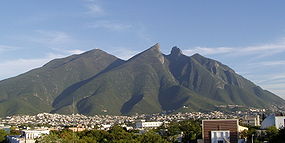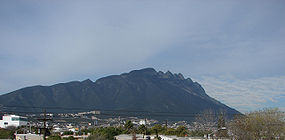
Cerro de la Silla, overlooking Monterrey, Mexico (Wikipedia)
In the 1962-1963 term at UT, I was 19, working my way through my sophomore year, and putting in about 20 hours a week as a sales and stock clerk at the University Co-op, the main college bookstore on The Drag (as Guadalupe Street, Austin's main traffic artery on the west side of UT, was known). I was also on the Steering Committee at the Wesley Foundation, the Methodist Church's college youth organization, itself housed on The Drag, but a few blocks farther north than the Co-op.
In my Wesley Foundation role, I had been active in the evenings or on weekends with a variety of activities, from simply hanging out with friends to volunteering for their coffee house, helping get speakers or entertainers, participating in a psychodrama, acting in a couple plays, doing the lighting for another, handling security for the place (locking up and being sure lights were out, essentially), playing ping-pong, going on Ban the (nuclear) Bomb marches, having picnics and swims with other folks out at nearby Lake Travis, attending religious philosophy study groups, etc.
Among the guest celebrities I booked were Neal Spelce (then a young, energetic, politically savvy local TV news anchor) and Pete Seeger (the then already famous songwriter, singer, and activist, who turns 90 on 5/3/09). He taught the large audience he attracted to sing along with him a variety of rousing folksongs and helped us see a bit better the significance of causes then still being pioneered in Austin, such as overcoming severe poverty and racial discrimination.
In early 1963, I took on a bit more ambitious Wesley Foundation project, coordinating and leading an exchange program visit by a number of UT students to Monterrey, Mexico, where, over our spring break, we would work with several Mexican college students in a mutual construction project, a new Methodist youth camp in the mountains just outside Monterrey. That I did not speak Spanish, had no construction experience, and was dealing with a quite full schedule without this added extracurricular activity left me undaunted.
As fools rush in, I took this newest endeavor on with gusto, outlining for myself and then fulfilling a careful timeline of target dates for completing a variety of tasks that would have all participants, including myself, ready with days to spare and the Mexican students standing by and hopefully eager to host us upon our arrival. I did delegate some of the preparation efforts and was fortunately and ably assisted by several interested students who spoke the primary language of our neighbor nation to the south.
Soon enough, our little co-ed band of about 15 students had all the right papers and were packed and ready one early spring morning and so set off in a small caravan, driving all day for a late arrival in Monterrey where a number of the Mexican students from a Monterrey campus and a Methodist Church met and enthusiastically greeted us and showed us where to stow our stuff, use restrooms,
 Cerro de la Silla, overlooking Monterrey, Mexico (Wikipedia) |
All would have been great at this point except for the heat and noise. Even though it was still early spring, Monterrey itself, as opposed to the nearby elevations, was still quite warm that night, and we gringos had no air-conditioning. Even with large open windows, there was not a breath of moving air. We were all tired enough after the trip, though, that I think we could have slept easily enough but for an adjacent tortilla factory's incessant metallic din of banging and grinding. The floor's hardness and a mixture of hot corn meal and oil smells are other etched-in memories from that time. We Norteamericanos were not made of such sturdy stuff, and I realized we must have seemed rather spoiled to our gracious hosts. I resolved not to complain even if I did not sleep during my whole time in Mexico.
The next day, we got another early start. After a light breakfast, we all boarded a church bus and soon were heading into the mountains. The views were pleasant if not then to my senses spectacular. I finally slept some on the way as we lurched this way and that, and by early afternoon we had reached the Methodist camp where we would be staying and working.
A few cabins had already been all but finished. We put our things in these and slept there the next couple nights. Food was for the most part simple and fast on our arrival and as we took our meal breaks from the work. Plenty of water was provided to drink. There was so much water available in fact that a nice-sized recreation pool was available in the camp, though it was as yet rather too cold for swimming.
Familiar with large parks, forests, and uninhabited expanses in the U.S., I was surprised that the camp was located very close to a small farming village. Evidently, even in the mountains, little land went unused.
On one of the nights we were at the camp, I had fallen asleep easily but then awoke a few hours later. So I got up and took a walk. It was cool outside, though not uncomfortably so.
I think I was then the only person up and moving about. Images from that walk have vividly remained with me, but I cannot be certain of my memory. There were a couple narrow roadways. The village's houses were close as if huddled together. Though at first slightly chilled in my shirt sleeves, I warmed up after I had been out awhile.
Here and there solitary naked lightbulbs dimly shone among the dwellings, but the stars were intensely bright and in vast numbers. Small fences surrounded most of the places. Enclosed in some were animals, a donkey here, roosting chickens there. A couple dogs were bothered by my close presence and barked, the noise terribly loud. I was afraid they would wake everyone up. Dawn began to brighten the sky, first in deep red hues, then with yellows as well.
The work involved mostly removing big tree stumps or boulders from the rocky soil so that big enough areas would be cleared and smoothed to later pour concrete foundations in wooden forms built for that purpose. On these basic foundations, the future cabins would go up, but that step would be left for future volunteer crews.
Our time, then, was first spent using sledge hammers and large chisels or other tools to dig narrow, several-inches-deep holes into or under the rock and stumps. Into these we placed sticks of dynamite, the loose surrounding dirt being tamped down over them. Then we lit their fuses, and ran for cover. The blasts made satisfactory booms and showered the area with splinters or chips. Sometimes large chunks of wood or almost a whole stump would be propelled upward. Once the debris had been gathered up and hauled out of the way, it was time to start over. There was nothing too complicated about the process.
In a couple days, we had cleared away several the cabin foundation areas, build some forms for the concrete, and even laid a couple of foundations. They were left gradually hardening as we finished up. I cannot recall now how we got the concrete in there, whether it was mixed on the spot from water plus lots of bagged ingredients or was hauled in by cement truck, ready to be poured. Either way, it was not a problem, and we had plenty for the two foundations.
 Cerro de la Mitras, overlooking Monterrey, Mexico (Wikipedia) |
The afternoon of the second or third day, as we were completing a final cleanup and putting away our tools, things got a little rowdy and, on some cue I had not seen, several of the UT students, to general merriment, suddenly picked me up and tossed me into the pool.
Our last day, the Mexican students who were working with us prepared a delicious supper for everyone. Raised for years in San Antonio or Austin, I expected TexMex fare, but it was not like that. There was no cheese, for instance, and no refried beans. Instead, there were thin, lean tender cuts of beef, black beans, fresh chopped tomatoes and onions, warm corn tortillas, and a tasty brown rice. There were also fresh pineapple chunks. It was all quite good, and there was plenty. I remember particularly thinking it must have been much better for us than what we usually ate in TX and called "Mexican food."
We said our goodbyes to some of the Mexican students. In that brief time, we had made new friends. Perhaps, we hoped, they might reciprocate the exchange and join us for a project up near Austin.
Later that night, back in Monterrey and before we returned to Austin, several of us went to a downtown bar or nightclub and had a few drinks. Although I had just one, some fruit-smoothie-like cocktail with tequila, I was definitely enjoying myself and afterward got rather friendly with one of the women in our party. We continued to see each other back in TX.
That mini-vacation had all the right elements for those who went down from UT. We could feel good about ourselves for having for several hours and a couple days worked really hard on a worthwhile project. (Never mind that we were helping to destroy the mountains' natural landscape and watershed, fostering a wasteful attitude toward available water resources, and taking away jobs from the Mexicans because we were willing to work for lower wages!) Meanwhile, our own relatively comfortable lifestyles were never threatened. We got away from our usual routines, had some welcome recreation, soaked in a bit of exotic, foreign culture, and quickly bonded among ourselves through sharing a little common adventure. Of course, almost nothing was actually changed in us or for our cordial Mexican hosts, but everyone had a great time, and there was abundant goodwill all 'round.
Back at UT, the consequences for me of having spent many hours over several weeks planning for our rewarding sojourn across the border, instead of on my studies, became apparent during the upcoming exams. Ever since, I have periodically had nightmares about major tests in the morning for which I was not prepared.
A spring can be a place of fresh upwelling thirst-quenching natural liquid, offering something vital, refreshing, and new. And a break may be a severing from what was old and no longer useful to us.
The following year, I would be working full time at Austin State Hospital, then in basic training at Fort Polk, LA. All in all, it seemed best to put ideas of a medical career behind me.
In retrospect, I must have known I had not chosen well in seeking to become a physician. Had I really buckled down, that goal likely would have been achieved, but it would not have been right for me. With greater awareness early on of my aptitudes and preferences then, I might have rewardingly gone right into financial planning, counseling, teaching, journalism, or even entertainment, as a humorist. I was often considered funny among my friends, especially when not trying to be. I think it was kind of the way Homer Simpson is instinctively, brilliantly amusing and makes everyone laugh but hardly ever tells jokes and makes it look as though he is just totally clueless. I mean, duh! If the shoe leather fits, chew it!
Still, even if, like most of us, I spent much of my life pursuing Plan B, things did not turn out so badly! It merely took me awhile to realize it.